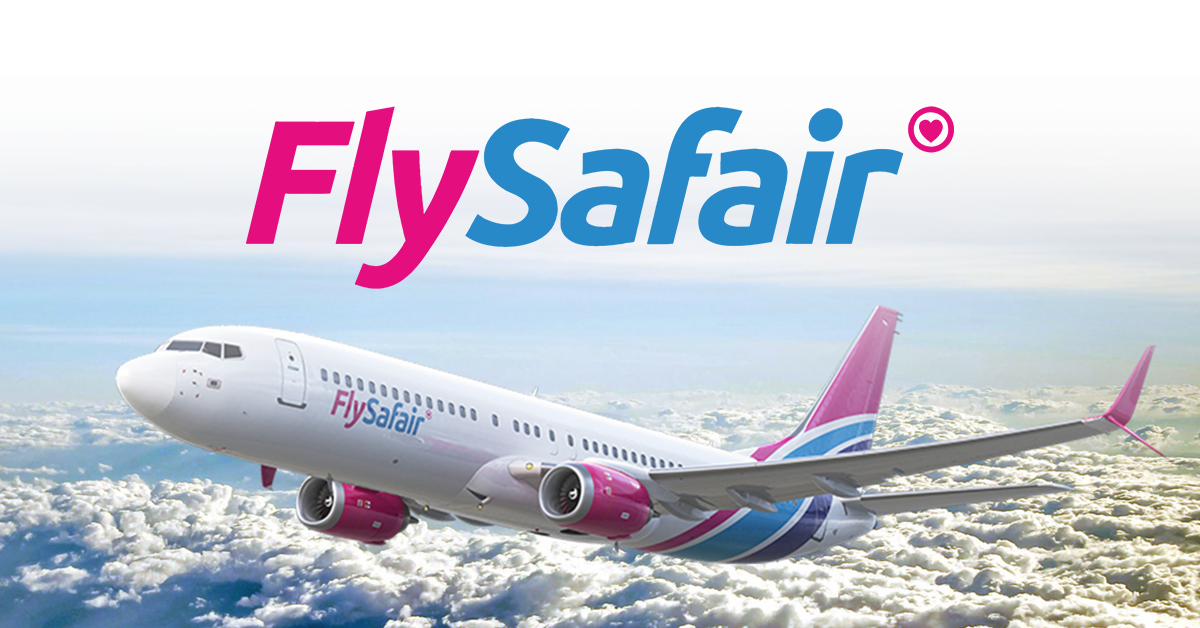Is FlySafair too big to ground?
A severe threat looms on the near-term future of FlySafair’s international flights following the ruling by the International Air Services Licensing Council (IASLC) within the Department of Transport that its shareholding structure violates limitations on foreign ownership.
Sanctions will follow, which could include fines or a suspension of FlySafair’s licence. This is why the airline has filed an urgent interdict against the council.
FlySafair currently operates on the Joburg-Harare, Joburg-Mauritius, Joburg-Victoria Falls, Joburg-Zanzibar as well as Cape Town-Windhoek cross-border routes. A suspension of this licence will mean a grounding on these routes.
It received approvals from the Air Services Licensing Council (ASLC) for 11 routes in 2022, and at that time, approvals for the Harare, Windhoek, and Zanzibar routes (and additional frequencies to Mauritius were outstanding). Additionally, there are a number of routes in that original list of approvals that are not yet operating.
Not much known about foreign shareholding
Under existing legislation, foreign entities may not own more than 25 percent of airlines based in South Africa.
Competitors Airlink and Global Aviation, the operator of Lift, complained to regulators about FlySafair’s shareholding two years ago, and the IASLC began a process to “clarify” FlySafair’s shareholding.
The transaction (regularly referred to euphemistically as a “restructuring”), which saw ASL Aviation Holdings hold a majority stake in FlySafair, happened more than five years ago in March 2019 — an entire year before the Covid-19 lockdown.
It acquired the Safair Investment Trust, an entity set up a decade ago to “fix” issues around control by ensuring that South African entities (the trust and an employee share-ownership scheme) held ±75 percent of the airline. Today, ASL ostensibly owns 74,86 percent of FlySafair.
Not much is known about the exact structure of this holding or the underlying control structure. It may be that the majority equity holder has reduced voting rights (25 percent) so that it complies.
The airline contends its shareholding complies with the spirit of the legislation, which many operators admit could be construed as vague.
The timing is questionable
While this only affects the airline’s international routes, the problem is one of timing.
Why has it taken four years to confirm something as simple as a shareholding? Why is this being dealt with now, ahead of the peak travel season? How were international routes approved two years ago when, at the same time, valid questions were being asked about its ownership structure?
For now, domestic flights remain unaffected as these operate under a separate licence.
The ASLC has reportedly begun its own investigation into the airline’s shareholding. (Here is yet more evidence of mind-boggling inefficiency that exists across the civil service — two separate entities within the same department that do similar and overlapping things but which issue different licences!)
Domestic flight grounding will be near-catastrophic
Any grounding of its domestic flights will be near-catastrophic for the market. FlySafair holds 60 percent of the market, higher than even the peak held by Comair (Kulula.com/British Airways) before it collapsed. This is an enormous chunk of the market.
It operates more than 5 000 flights a month using 36 aircraft. Between Joburg and Cape Town alone, it operates up to 27 return flights a day (including the six out of Lanseria). Lift operates seven, Airlink seven, and SAA 10.
For all intents and purposes, FlySafair is our de facto national carrier.
Despite its gallant turnaround, SAA remains a shadow of its former self. It sponsors the Springboks — and flies over stadiums before test matches — and has just signed a partnership with the Proteas as their domestic carrier.
Any guesses on when the ASLC will magically conclude its investigation into FlySafair’s ownership (Why aren’t the two entities sharing documentation?!)? In December? Unlikely, given the glacial pace of government . . . Just before the Easter weekend?
What needs to happen
Sanity really ought to prevail in this dispute, though it rarely does unless it gets ministerial attention. For a start, a moratorium should be put in place until the current legislation can be amended, to minimise the effect on South Africans.
If the airline is grounded, capacity will immediately be significantly constrained, and prices will spike to levels we didn’t even see after Comair’s demise.
Create an environment with certainty so foreigners (like ASL and Qatar Airways, which bought 25 percent in Airlink this year) and domestic players can invest on a level playing field.
Of course, competitors can feel aggrieved if they believe that they are limited to 25 percent ownership by non-South Africans. The 25 percent limit may have been appropriate five decades ago, but it is hardly useful in a globalised world.
Realistically, the limit should probably be 49 percent (in an ideal world, there would be no limit).
There would be ways to get that to “effectively” 51 percent, with different classes of shares and voting rights. And once that limit is clearly set and in place, FlySafair should be afforded a reasonable time to comply.
ASL would no doubt want a return on its investment and there aren’t too many South African buyers of 25 percent stakes in airlines.
There exists no carrier in the market right now that can suddenly fill a vacuum left by FlySafair or even part of that vacuum. This is a situation that the regulator(s) allowed to get away from them — for years!
They bear the ultimate responsibility for this, but it’s looking likely that the flying public may yet pay the price . . . — Moneyweb











